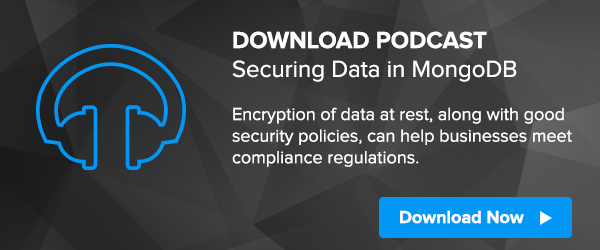MongoDB: Encryption Best Practices
As the importance of encryption increases across the regulatory spectrum, it is heartening to see database vendors implementing encryption and encryption key management that meet security best practices. MongoDB Enterprise is one of the most popular modern databases and has given its customers the ability to quickly and effectively implement encryption and good key management at the level of the database itself. This means that MongoDB Enterprise customers can transparently implement encryption directly in the database without deploying third party file or volume based encryption products to accomplish this task. MongoDB customers enjoy rapid deployment of encryption, a unified management interface to the database, high performance encryption, and integrated encryption key management based on the industry standard Key Management Interoperability Protocol (KMIP).
 By basing key management on the OASIS KMIP standard MongoDB is providing real benefits to their customers. These include:
By basing key management on the OASIS KMIP standard MongoDB is providing real benefits to their customers. These include:
- Rapid implementation of key management with no need for developer resources.
- No requirement for server-side software libraries, updates, and patching.
- Secure encryption key retrieval services based on TLS.
- Vendor neutrality for encryption key management services.
- Vendor portability and avoidance of vendor lock-in.
- Seamless migration from one key management solution to another.
MongoDB Enterprise is a case-study in the benefits of using open standards for encryption and key management. MongoDB’s customers can choose the key management solution that makes the most sense for them, and having choices reduces the cost of encryption key management.
MongoDB: Encryption Key Management Made Easy
Townsend Security's Alliance Key Manager solution works out of the box with MongoDB Enterprise to help customers meet compliance regulations which require encryption of sensitive data. It takes just a few minutes to deploy Alliance Key Manager and to configure MongoDB for key management. On first boot, Alliance Key Manager creates a set of strong encryption keys including a 256-bit AES key that can be used with MongoDB, and it creates a set of PKI certificates used for TLS authentication. The PKI certificates are copied to the MongoDB server to secure the connection to the key manager. A quick command or two from the MongoDB command line console and, Voila! Your MongoDB encryption key is now fully protected by a key encryption key on Alliance Key Manager. You have an encrypted MongoDB database and a highly redundant and recoverable encryption key management infrastructure. From the technical team at MongoDB:
“The encryption occurs transparently in the storage layer; i.e. all data files are fully encrypted from a file system perspective, and data only exists in an unencrypted state in memory and during transmission.”
After installing the key manager certificates on the server hosting the MongoDB database, here is an example of the command to enable encryption:
mongod --enableEncryption --kmipServerName akmmongo --kmipServerCAFile /etc/mongodb-kmip/AKMRootCACertificate.pem --kmipClientCertificateFile /etc/mongodb-kmip/AKMClientCertificate.pem --dbpath /var/lib/mongodb/
It’s that simple.
With Alliance Key Manager you have your choice of network-attached hardware security modules (HSMs), VMware virtual machines, and dedicated cloud instances in Microsoft Azure and Amazon Web Services. The key manager works the same way in all environments so you can even mix and match hardware, VMs, and cloud instances to achieve the level of security that is right for your organization. All instances of Alliance Key Manager are dedicated to you with no access by cloud service providers or third parties. Key custody remains exclusively under your control.
Many MongoDB customers deploy the database in VMware environments. Alliance Key Manager also runs in VMware as a virtual machine. You can deploy the key manager in a VMware security group and protect one or more instances of MongoDB across the entire VMware environment. If you are running on a VMware vCloud platform the same support is provided for key management.
For compliance, Alliance Key Manager is validated for PCI-DSS compliance in the VMware platform. This will help you achieve PCI-DSS compliance for your MongoDB database and applications. The PCI-DSS statement of compliance is here.
MongoDB is rapidly becoming the high performance, scalable, NoSQL database of choice for organizations large and small. As such it becomes a part of the critical infrastructure for business applications. Alliance Key Manager also implements high availability features such as automatic, real-time encryption key mirroring, and backup. For customers deploying the hardware version of Alliance Key Manager, there is redundancy at the hardware level with dual hot-swappable RAID disks, redundant power supplies, and redundant network interfaces. All of these features mean that your key management infrastructure will be resilient and reliable.
Alliance Key Manager will help you will meet common compliance regulations such as PCI-DSS, HIPAA, FFIEC, FISMA, the EU General Data Protection Regulation (GDPR), and other compliance schemes. Alliance Key Manager regardless of platform is based on the same FIPS 140-2 compliant software found in our enterprise level HSM. With no restrictions or license costs for client-side connections, you can protect as many MongoDB databases as you like with one Alliance Key Manager.
The product team at MongoDB did a great job of implementing encryption and key management for their customers. They deserve to be applauded for basing their solution on industry standards like KMIP. This will lower the bar for getting encryption right in the database. With Alliance Key Manager, getting encryption right means rapid deployment, conservation of developer resources, lower administration costs, and provable compliance.
A match made in techno-heaven.
Patrick

